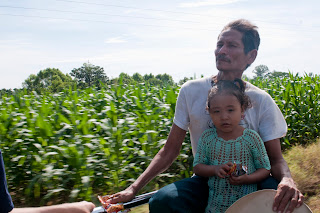In 2005, a team of college students
armed with goodwill and the best of intentions set off to Nicaragua.
Their mission: to build a house for a poor Central American family.
As the last of the nails were hammered
in, they stepped back to admire our accomplishments. Neighbors walked over to
ask about the house. But as many thank yous were offered, an equal amount of
requests accompanied them. Could they
build their family a house, give them a job, or pay their medical bills? One
request particularly touched everyone's heart. A man came to work for free and
at the end of the week asked for $400 to pay for a surgery to save his mother's
life. How could so little be necessary
to do so much? But a deeper realization
came to these 18 and 19 year olds-- that no one could
build enough houses, or provide enough free medical serviced to end
poverty. Changes were needed to end the root
causes of poverty, rather than just alleviate its symptoms.
Fast forward 7 years. Its 2013 and
an organization named Semilla Nueva, started by those once naïve boys, is
changing the face of rural Guatemala, one farmer at a time. Its simple, the
majority of the world’s poor are farmers. What they need are ways to
increase their income from farming. Semilla Nueva, which means new
seed, brings them simple farming changes that help them rebuild their
soils, feed their families, and up to double their income. Their aim is to help
farmers earn enough to build their own houses and pay their own medical bills.
A perfect way to understand what Semilla
Nueva does for farmers is through a local bean called pigeonpea. Semilla Nueva
is currently working to introduced a new type of pigeonpea that is small enough
to be grown in between the rows of farmers' traditional crops, corn and sesame.
Farmers don't increase their costs, don't lose their traditional crops, and in
exchange get an extra crop to eat and sell. Pigeonpea also rebuilds farmers'
soils and helps farmers grow a complete protein in one of the fourth most
malnourished countries in the world. It's a win-win for farmers, and an
innovation which could help the over 250,000 families who grow corn in tropical
Guatemala. Working on the ground, Semilla Nueva's staff have seen the impacts
that these changes can make in a farmer's life.
Saul Gonzalez is a farmer
in the Guatemalan village of Conrado de la Cruz. He is the sole breadwinner for
his family, and lately for many of his grandchildren as well. Despite being one
of the poorest farmers Semilla Nueva works with, Saul never ceases to amaze and
inspire with his contagious smile, unstoppable work ethic, and incessant willingness to try new ideas. He tried
pigeonpea on a small parcel of land in 2011, and seeing the results, planted
pigeonpea with all his crops in 2012. And that decision may have saved a life.
 |
| Saul Gonzalez, Semilla Nueva promotor farmer. |
Last year, Saul 's learned
that his nine year old granddaugher's brain surgery had been unsuccessful. The
public hospital had tried to stop the advance of a brain tumor, but it had come
back and the government doctors were beyond their ability. A local non-profit
had teamed up with a hospital in Canada to provide another surgery to Maria,
but only if Saul could cover $220 of visa applications and other costs. He
asked friends and family, but no one had the money to help.
Saul didn't have the money, and again
the dilemma surfaced which is so common in the developing world: a few hundred
dollars for someone's life. But Saul did have something. This was the first
year he'd planted a large amount of pigeonpea, and it would soon be ready to
harvest. He sold the crop in advance and paid the visa.
Maria began her surgery on February 22nd
at the Children's Hospital in
Toronto.
| Maria de Los Angeles, Saul's grandaughter, preparing for surgery and keeping a smile on her face. |
Semilla Nueva's hope and pride come from
the
the continual repeat of this story. Farmer by farmer, surgery by
surgery, home by home, we are watching as our partner farmers earn the means to care for their own lives. It is
a string of stories that are just beginning.
Next year we plan to watch farmers earn
over $25,000 from selling pigeonpea. The year after, we expect six digits. And
this is only one of the technologies Semilla Nueva is promoting in our ten
partner villages. As other NGO's and government agencies are starting to copy
this model, this impact can only grow. More than numbers on a paper, this is
what keeps us going. We are seeing these
lives change in front of us. Their stories become ours. And the moral of the
story is simple: with some dedication and some smarts, we can solve big
problems together.
| Semilla Nueva agronomist Trinidad Recinos with a local farmer. |
Government should really identify the root causes of poverty so they know how to address the issue.
ReplyDeleteGood reaad
ReplyDelete